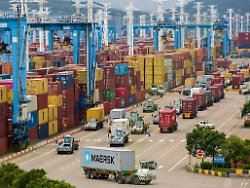Tuesday 17th August 2021
Problem for Germany too
Traffic jams in front of China’s ports are getting longer and longer
Because an employee tests positive for the corona virus, China’s second largest port is partially closed. Ships are now coming in again, but the queues are getting longer and longer. This could also have an impact on the German economy.
Several Chinese ports are threatened with overload. The reason is the traffic jam in front of the second largest port, Ningbo, where, according to the data provider Refinitiv, more than 50 container ships were waiting to be processed. The corona case of a port employee became known there a week ago on Wednesday, whereupon operations were temporarily suspended. Leading international shipping companies warn their customers about delays and route adjustments.
At least 14 ships operated by the French shipping and logistics company CMA CGM, five by Maersk and four Hapag-Lloyd ships do not want to call at Ningbo for the time being. Dozens of other ships changed their schedules, as the shipping companies announced. As the queues in front of the major Chinese ports are getting bigger and bigger, the fear of increasing delivery bottlenecks is growing worldwide.
The Chinese Ministry of Transport has ordered all ports to set up special teams for foreign ships. Their crews are required to provide health certificates or negative tests before the cargo can be unloaded or the ships loaded. “China’s zero-tolerance policy is good for the pandemic, but bad for supply chains,” said Dawn Tiura, head of the Sourcing Industry Group, a US-based association for the procurement industry. “This timing is very difficult when you consider that in addition to the upcoming Christmas shopping season, shopping at the beginning of school is also increasing.”
Problem for trading nation Germany?
The port operator Ningbo Zhoushan stated that the daily handling volume has now reached around 90 percent of its average July value. Ships that are supposed to call at the terminal will still be diverted to nearby ports. Shanghai Port, for example, had 34 waiting ships, and 18 more waiting in front of the port of Xiamen. “China is an important part of the global supply chain,” said Richard Lebovitz, head of LeanDNA’s US consultancy. “Any shutdowns or delays from China have the potential to delay finished goods by two or three levels.”
According to the German economy, the corona-related temporary closure of the Chinese commercial port Yantian in May and June has more serious consequences for global supply chains and the flow of goods than the shipwreck in the Suez Canal before. Especially for the technology and electronics industry, the delays that had occurred in the meanwhile in container loading were a problem, as the Federal Association of Materials Management, Purchasing and Logistics (BME) found out in a member survey. The disruption of supply chains is a serious problem for Germany as a trading nation. Almost 64 percent of industrial companies complained in the July survey by the Ifo Institute about bottlenecks in preliminary products such as chips.
.
